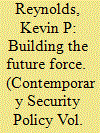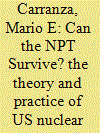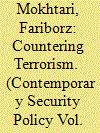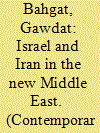|
|
|
Sort Order |
|
|
|
Items / Page
|
|
|
|
|
|
|
| Srl | Item |
| 1 |
ID:
076152


|
|
|
|
|
| Publication |
2006.
|
| Summary/Abstract |
The United States military is in the midst of a major transformation effort, largely conceived around weapons systems procurement. This process of transformation through acquisition will not produce fully operational capabilities for another 15-20 years. But will the capability sets that these weapons represent enable, or will they constrain, the policy options of future national decision-makers? Although national security policy should drive the development of future military capabilities, that is seldom the case, as these problems show. The problem arises largely from three challenges to transformation: the difference in planning horizons between national security and weapons systems or policy lag; problems with the role of the armed forces in weapons systems decision-making; and the Department of Defense's fixation on the narrow theoretical constructs of Network Centric Warfare. These problems are illustrated here by the US Army's dominant contemporary procurement project, the Future Combat System. Overcoming these challenges will require bureaucratic reform throughout the government's national security community, including the National Security Council, Department of Defense and the Congressional Armed Services committees.
|
|
|
|
|
|
|
|
|
|
|
|
|
|
|
|
| 2 |
ID:
076153


|
|
|
|
|
| Publication |
2006.
|
| Summary/Abstract |
This article examines the prospects for survival of the Nuclear Non-Proliferation Treaty in the post-9/11 world, arguing that American non-proliferation policy and the future of the NPT are inextricably linked. It discusses the shift from the Clinton administration's nuclear arms control and disarmament agenda of the mid-1990s to the Bush administration's preference for informal arms control regimes and the new policy of non-proliferation exceptionalism that distinguishes between good proliferators (India, Pakistan) and bad proliferators (North Korea, Iran). The Bush administration's penchant for unilateral foreign security policies and its double standards in implementing export restrictions on sensitive technologies while disavowing American nuclear disarmament obligations undermine the NPT bargain and endanger the treaty. The Bush administration's security-oriented strategy and acceptance of selective proliferation for balance of power purposes may lead to the emergence of a silent crowd armed with nuclear weapon capabilities. The key to preserving the relevance of the NPT is to reconnect nuclear non-proliferation with nuclear disarmament, while strengthening the treaty's enforcement machinery against non-compliers.
|
|
|
|
|
|
|
|
|
|
|
|
|
|
|
|
| 3 |
ID:
076149


|
|
|
|
|
| Publication |
2006.
|
| Summary/Abstract |
Despite five years of concerted effort to eradicate it, terrorism has managed to taunt us continuously. Understanding terrorism and that which makes a person a terrorist is essential, but will not be enough. Dealing with terrorism is a multi-faceted problem reflecting numerous dimensions, peoples and cultures. To be effective, understanding must translate into wise policies, and policies into actions, carried out with judicious sensibility. The emotional desire to simplify terrorism as a characteristic of a certain culture or geographic region ought to be rejected as misguided and counter-productive. This article suggests a crucial distinction between leaders and recruits, and posits that terrorist movements with political aspirations may be converted. Two case studies, Hezbollah and Hamas, are briefly presented to illustrate that possibility.
|
|
|
|
|
|
|
|
|
|
|
|
|
|
|
|
| 4 |
ID:
076150


|
|
|
|
|
| Publication |
2006.
|
| Summary/Abstract |
Is Israeli security best assured by strategic contraction or expansion? Does Israel's decision to build a security fence and the nation's security policies of contracting, rather than expanding, mark a major strategic shift in policy to make Israel more secure in the long run? Or should more attention be focused on the 2006 invasion of Lebanon as signalling a return to the older security policies based on expansion of the country's security sphere, placing Israel more in context with the American-led war on terrorism, with an emphasis on pre-emption to eliminate short-run terrorist threats? This article analyses Israel's recent security policy choices, especially the decision to erect the wall separating Israelis from Palestinians, combined with the unilateral withdrawal from Gaza in August 2005, followed by the decision to return to Gaza and invade Lebanon in July 2006. Did these events represent the failure of Israeli security initiatives of the early 2000s and a return to old security dynamics of expansion vs. contraction?
|
|
|
|
|
|
|
|
|
|
|
|
|
|
|
|
| 5 |
ID:
076148


|
|
|
|
|
| Publication |
2006.
|
| Summary/Abstract |
Students of Middle Eastern policy and policy-makers in Europe and the United States have traditionally addressed the two Middle East subsystems - the Persian Gulf and the Levant - separately. This assumption was challenged by the July War from 12 July to 14 August 2006 between Israel and Hezbollah, largely seen as a proxy contest between Israel and Iran. This article examines the historical relationship between Tel Aviv and Tehran and its deterioration into proxy war. Particular attention is given to the creation of Hezbollah in 1982. The article also identifies the major changes in the emerging security environment in the Middle East following the 2006 war. The experience of the war shows that military means no longer are sufficient to end Middle East conflict. Although the war occurred largely as part of a reaction against the Middle East peace process, the experience reaffirms the overwhelming importance of a long-term solution that establishes a genuine peace between Israel and its neighbours and creates rapprochement with Iran.
|
|
|
|
|
|
|
|
|
|
|
|
|
|
|
|
| 6 |
ID:
076151


|
|
|
| 7 |
ID:
076154


|
|
|
|
|
| Publication |
2006.
|
| Summary/Abstract |
Ballistic missile and WMD proliferation go hand-in-hand, yet missile norms remain the most chronically under-developed of all the international arrangements surrounding WMD. This article argues that although the link between missiles and WMD undoubtedly is important, it should not be overplayed when trying to establish norms and controls over international missile proliferation. Ballistic missile control will certainly reinforce international controls over WMD, but will need to be constructed on a different set of principles. It no longer is sufficient waiting, as if for something to turn up. Nonetheless, there is a way forward, one that requires a pragmatic deference to existing realities, but tempered with a certain optimism that the way chosen will produce results in the long term rather than immediately. Bans are infeasible, but control may result from a process of patient construction, including such elements as regional agreements and a shift to missile defence.
|
|
|
|
|
|
|
|
|
|
|
|
|
|
|
|
|
|
|
|
|